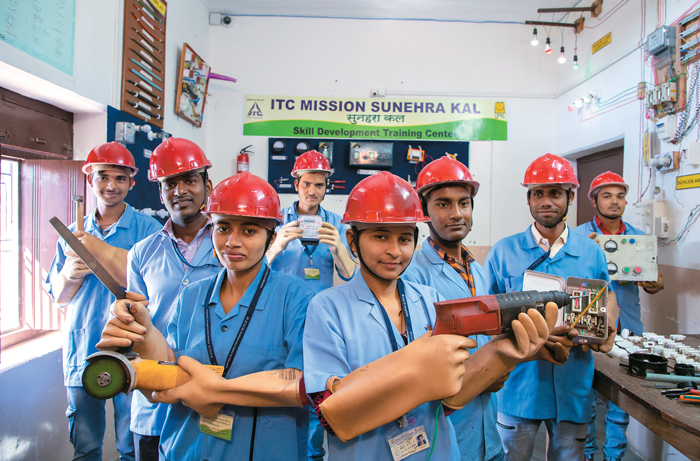
ITC MAKING THE RIGHT intervention FOR a BETTER FUTURE
ITC
ITC Limited is among India’s foremost private sector companies with a market
capitalisation of over US$ 50 billion and Gross Sales Value of over US$ 10
billion.
A diversified conglomerate with a significant presence across all three sectors
of
the economy – agriculture, manufacturing and services – ITC’s businesses span
Fast
Moving Consumer Goods (FMCG), Hotels, Paperboards & Packaging, Agri Business
and Information Technology. Apart from being the country's leading FMCG
marketer,
ITC is the market leader in the Indian Paperboards & Packaging sector, a
pre-eminent
hotel chain in India and a trailblazer in ‘Responsible Luxury’. One of India’s
oldest and
largest integrated Agri Businesses, ITC’s leadership position in this sector is
anchored
in its strong and enduring partnerships with farming communities across India.
The
Company’s wholly-owned subsidiary, ITC Infotech, is a specialised global full
services
technology provider.
A global exemplar in Sustainability, ITC is the only
enterprise in the world of
comparable dimensions to be carbon-positive, water-positive and solid waste
recycling
positive for over a decade now. ITC has created over 6 million sustainable
livelihoods.
ITC’s avowed mission to create larger societal value has driven
the Company’s
Corporate Social Responsibility (CSR) policy and practices for over two decades.
Through its Social Investments Programme, Mission Sunehra Kal, ITC engages with
multiple stakeholders – rural communities across India where ITC has
agri-business
operations or those residing in close proximity to ITC’s production units, as
well as
government bodies, programme implementation partners and technical institutions
–
to develop and implement sustainable, replicable and scalable models for
conservation
of natural resources and ensuring societal welfare and inclusive development
across its catchments in 27 states. The core purpose of ITC’s Mission Sunehra
Kal
programme is to secure the livelihoods of these marginalised communities not
just
for today but also for the future and create adarsh habitations for the
stakeholders.
The programme encompasses interventions in Water Stewardship, Social Forestry,
Animal Husbandry, Sustainable Agriculture, Education, Skilling, Sanitation and
Solid
Waste Management and Women Empowerment.
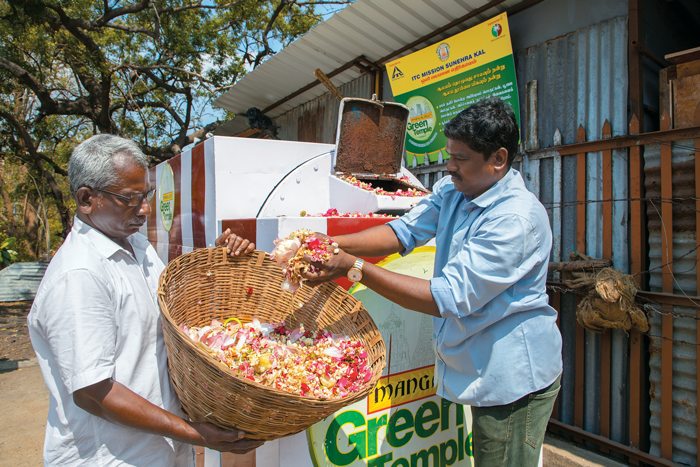
In Chennai, Tamil Nadu, the work done at Kapaleeshwarar Temple is an example of the 'Green Temple' initiative of ITC's Social Investments Programme along with several other waste management projects, but tailored to local situations, like promotion of composting from the waster (flowers and leaves and other bio perishable offerings) generated in temples.
The next few pages, which provide a glimpse of ITC’s CSR
activities in Haridwar, Uttarakhand, Jhalawar, Rajasthan,
Bhadradri Kothugudem, Telangana and Coimbatore, Tamil
Nadu, clearly demonstrate ITC’s commitment, conviction and
contribution towards making a meaningful difference to the
lives of its stakeholders.
ITC’s Water Stewardship Programme has adopted
a
participatory approach to inform and train local communities
to carry out a range of activities related to storing and utilizing
rainwater for irrigation. People have also begun to understand
that such practices help enhance the groundwater level. The
efforts have brought about a visible behavioural change amongst
the beneficiaries (farmers).
He is also President of the Cricket
Association for the
Blind in India (CABI) and the World Blind Cricket Ltd (WBC). “Through cricket,
Samarthanam has been
able to transform the lives of many (blind persons). IndusInd for the last few
years has supported us in
a big way,” says Mahantesh.
IndusInd is the team sponsor. “Their commitment
made us comfortable and their continuous supports
have set a trend. The credit goes to them for not just promoting but exciting
others to support us,”
says Mahantesh.
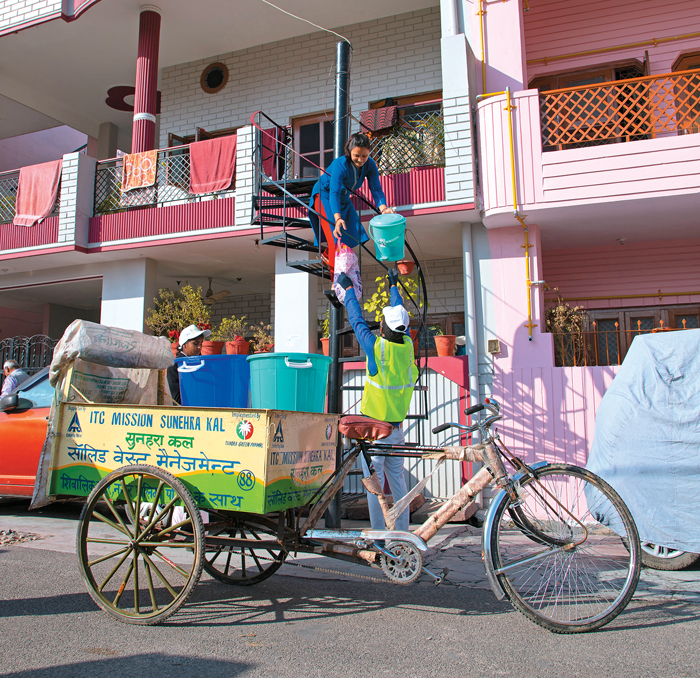
The Shivalik Nagar area near Haridwar, a CSR (ITC)-supported Solid Waste Management (SWM) initiative, to convert segregated wet products at source into compost and solid waste for scrap.
ITC’s Water Stewardship initiatives have been successfully
implemented in the villages of Tanda Banjara, Aurangabad,
Garh Meerpur, Hazara Grunt in Haridwar.
Similar to the success in
Haridwar, ITC’s Water Stewardship
Programme has improved living standards and farm profitability
of beneficiaries in Jhalawar, Rajasthan. ITC’s interventions,
including construction of check dams, have led to the mobilisation
of local communities to form social institutions like Water User
Groups (WUGs) to enable ownership, participatory planning
and proper monitoring of the progress and management.
Village development committee and WUGs keep track of the
construction along with partners like IIRD (NGO) and local
Panchayats. The intervention has also enabled farmers to move to
other high yielding and cash generating crops.
IndusInd Bank has empowered 65,000 women through this initiative by making them aware of their legal rights. This programme has for the first time, given them a voice to not only fight domestic violence but also to challenge societal norms and affect change in other areas.
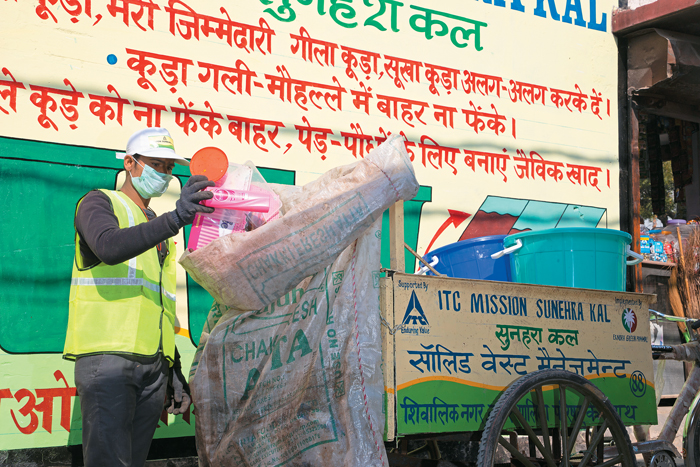
The amount generated for scrap is an incentive for the garbage collector. The system has a user fee concept by residents. Environmental benefits: The SWM has reduced the need to have landfills.
The Water Stewardship programme in Coimbatore, Tamil Nadu, has not only benefitted the farmers but also the nonfarming communities, including tribals in the area. Former farm labourers have learnt and implemented new techniques of farming in the land that they had previously abandoned due to lack of water. The programme has indeed has brought a perceptible change in the economic condition of the farmers in the region, with cultivation of new crops and adoption of newer techniques. Successful outcomes of ITC’s interventions were evident in the water tank management initiative in Salaivembu village, Banana plantations and Coconut farm at Kandiyur village in Coimbatore, where water use efficiency has been enhanced through the adoption of appropriate irrigation and agronomical practices.
ITC, under its Sustainable Agriculture initiative, promotes a combination of solutions for efficient management of water, enhancing land productivity, minimising cultivation costs and optimising natural resource use through demonstration plots, farmer field schools and on-site training. Farmer Field Schools have helped reverse migration of farmers to cities to work as labourers through dissemination of a package of practices and agricultural techniques to enhance productivity and build resilience by enabling Climate Smart Agriculture.
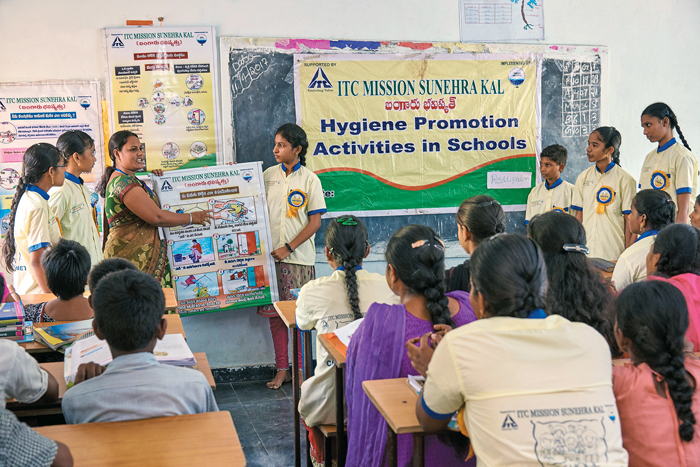
Health awareness campaign in Government Schools is a major activity undertaken by ITC. Its focus is on basic hygiene awareness among the children in schools.
Pasture land development in Jhalawar,
brought about by
ITC’s intervention, has helped villagers generate enough
fodder for cows and goats so that they do not have to purchase
it. In addition, it helps address the challenge of soil erosion
and has resulted in improvement of biodiversity through
indigenous flora and fauna regeneration, with native species
of snakes and birds visiting the place.
ITC also implements a Social
Forestry Programme that
offers an economically viable land-use option to small-holder
farmers by assisting them convert their degraded or low
productivity lands into pulpwood plantations. The programme
focuses on ensuring food, fuel and wood security in Bhadradari
Kothugudem, Telangana. The Livestock Development
Programme focuses on improving the productivity of milch
animals as an alternative source of income and livelihood to
the smallholder and landless farmers.
ITC’s Solid Waste Management (SWM) Programme has models for Cities, Towns and Temples with focus on source segregation and waste management close to the generator. The Programme collaborates with Municipal Corporations, Communities as well as Rag-pickers and Waste collectors, to reduce waste to land-fills and enables increase in the earnings of the waste collectors. This community owned intervention has success stories to tell in the Shivalik Nagar area of Haridwar, Uttarakhand, with the local government appreciating and supporting ITC’s efforts in creating a self-sustaining model that practises source segregation and decentralised waste management, including home-based composting.
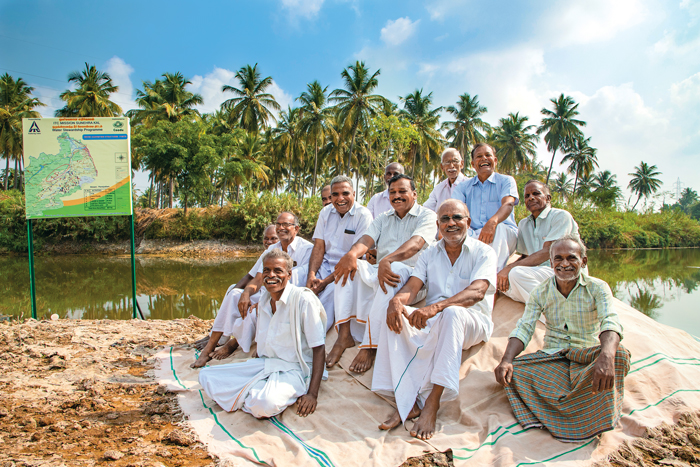
The water stewardship in Coimbatore area has helped not only the farmers but also the tribals around this area. Happy farmers at the water catchment at Seeliyur village constructed by ITC.
The SWM and sanitation intervention in Medur and other villages of Coimbatore, Tamil Nadu, is representative of ITC’s focus on creating healthy and hygienic habitations. The Company’s skill development initiatives, with 8-12 week courses, focuses on building market relevant skills so as to make potential job seekers industry-ready and employable in the manufacturing or service sectors, including hospitality, electrical, automotive repair, retail, bedside assistance. The programme has achieved high outcomes with about 70% of those trained, including boys and girls from underprivileged households, and those from Scheduled Castes and Tribes (SC and ST), getting absorbed in formal employment.
ITC’s intervention in primary education focuses on improving the learning levels of the children belonging to marginalized sections of society, through an interactive pedagogy. The same was evident at Bhadradari Kothugudem, Telangana. The lives of ultra-poor women have also witnessed a considerable transformation, in terms of financial independence and social inclusion through ITC interventions in Women’s Empowerment. The programme has developed these women into entrepreneurs with interests in on-farm and off-farm livelihoods. The beneficiary locations: Dhanoda (Checkdam), Marumkheri (Farmer field school and Women FFS), Dubliya (Seed multiplication plot), Gadiya (Pasture land development) and Jhalawar city (Vocational training center).
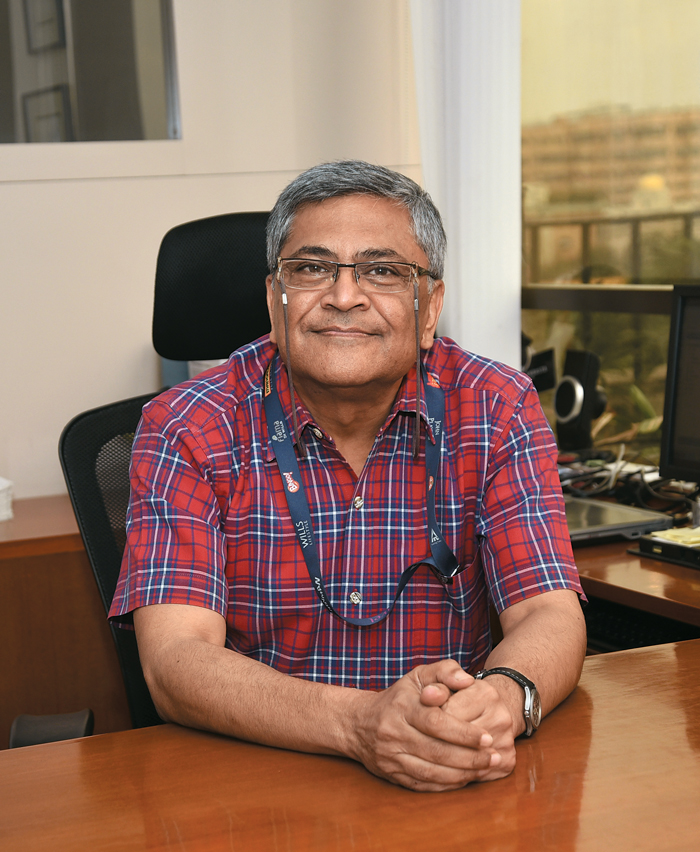
DR. ASHESH AMBASTA
Executive Vice President and Head Social Investments, ITC
What does CSR as an activity mean for ITC and its employees?
ITC’s overarching commitment to
create societal value is manifest in its
CSR initiatives that embrace the most
disadvantaged sections of society,
through economic empowerment based
on grass-roots capacity building. The
interventions target some of the most
significant development challenges of
the country through soil and moisture
conservation, making agriculture climatesmart
and resilient, enabling alternate
sources of income through its improved
animal husbandry programme, women
empowerment and also helping impact
Human Development Indices through
focus on education, skilling, hygienic
habitations through sanitation and solid
waste management. All CSR interventions
are aligned to specific Sustainable
Development Goals (SDGs).
ITC has invested time and resources
on CSR, and has a full-fledged Social
Investments team which manages CSR interventions pan-India. The employees at
its various Units engage and provide local
supervision and support where relevant. It
is a matter of great pride for its employees
that ITC is a pioneer in the Triple Bottom
Line approach in the country.
How critical is the company's CSR intervention in various locations in India?
ITC’s CSR interventions are spread
across 235 districts of 27 states. Its key
stakeholders include:
a) Rural communities with whom ITC’s
agri-businesses have forged long and
enduring partnerships through crop
development and procurement activities;
and
b) Communities residing in close proximity
of our manufacturing units.
While such economic linkages have
generated wealth for rural households
on a sustained basis, they also look to the
Company to help find viable solutions to
combat extreme weather episodes and
to aid in the creation of the necessary
socio-economic infrastructure to enable
significant improvements in their Human
Development Indices.
ITC’s CSR interventions focus on
creation of Adarsh Habitations for its
stakeholder groups. The approach includes participatory and sustainable
development
with formation and strengthening of
grass-root institutions, inclusive growth,
driving behaviour change through IEC
and demand generation, partnerships
with Governments and collaboration with
National and international agencies for
access to latest technical knowhow.
ITC’s CSR interventions have achieved
significant scale over time, formed strong
multi-stakeholder partnerships across
geographies and thematic interventions
and created huge environmental and social
impact for its stakeholder communities.
Kindly share the importance of achieving the right outcome for a CSR intervention?
I believe it is critical to focus on driving
Outcomes and Impacts, rather than just
focusing on Outputs and Coverage to
achieve the development agenda. Once
the Outcomes are clearly identified and
agreed, all the stakeholders – Partners,
Communities, government bodies can
initiate appropriate actions to move
towards the desired outcomes. Lack of
clearly defined Outcomes, may lead to lots
of activity and spends on CSR, but not the
desired results in the development space.
Just to illustrate Solid Waste management
programmes must focus on minimizing waste to landfill as an outcome rather than
just
collecting waste; the sanitation programmes
must aim to achieve Open Defecation Free
Catchments rather than merely building
toilets; sustainable agriculture interventions
must aim to enhance farm incomes and
improve resilience of farming community,
amongst others.
ITC’s CSR interventions have clearly
defined outcomes and drive sound impacts,
as assessed by third party studies. To
illustrate,
- Water storage potential of 34.64 million kl created.
- Increase in farm incomes by over 140% for wheat crop.
- Significant improvement in learning of children in government primary schools.
- Skilling 67,496 youth till date and formal employment of 32,478 in the last three years.
- 95% of the project catchments having been declared Open Defecation Free by the Government.
- Community owned, decentralised waste management with less than 14% waste reaching the landfills.
- 22,700 ultra-poor women empowered, and 70% of the graduated women earning more than Rs. 5,000/- pm from a base of less than Rs 1,800/- pm through entrepreneurship.
Nanjan, Solampilayam village near Coimbatore: I am thankful to ITC for the guidance. We were just farm labourers, now we use a new farm technique and it has earned us more revenue
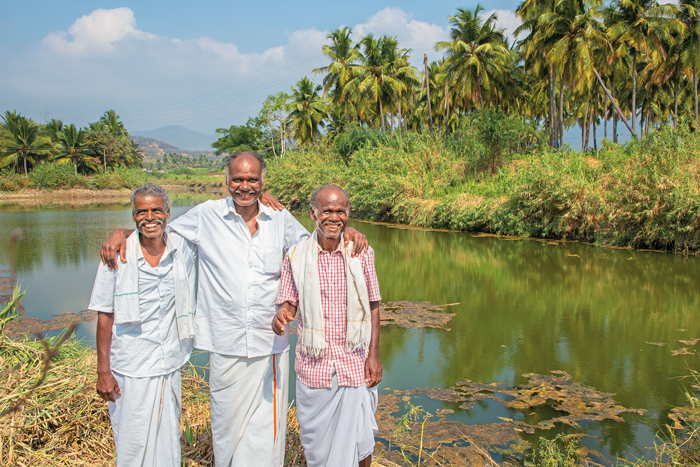
Ukayan, Solampilayam village near Coimbatore: From my forefathers’ time, we have been just sowing the seeds that we collect. Now with ITC, we sow better seeds for high yield
